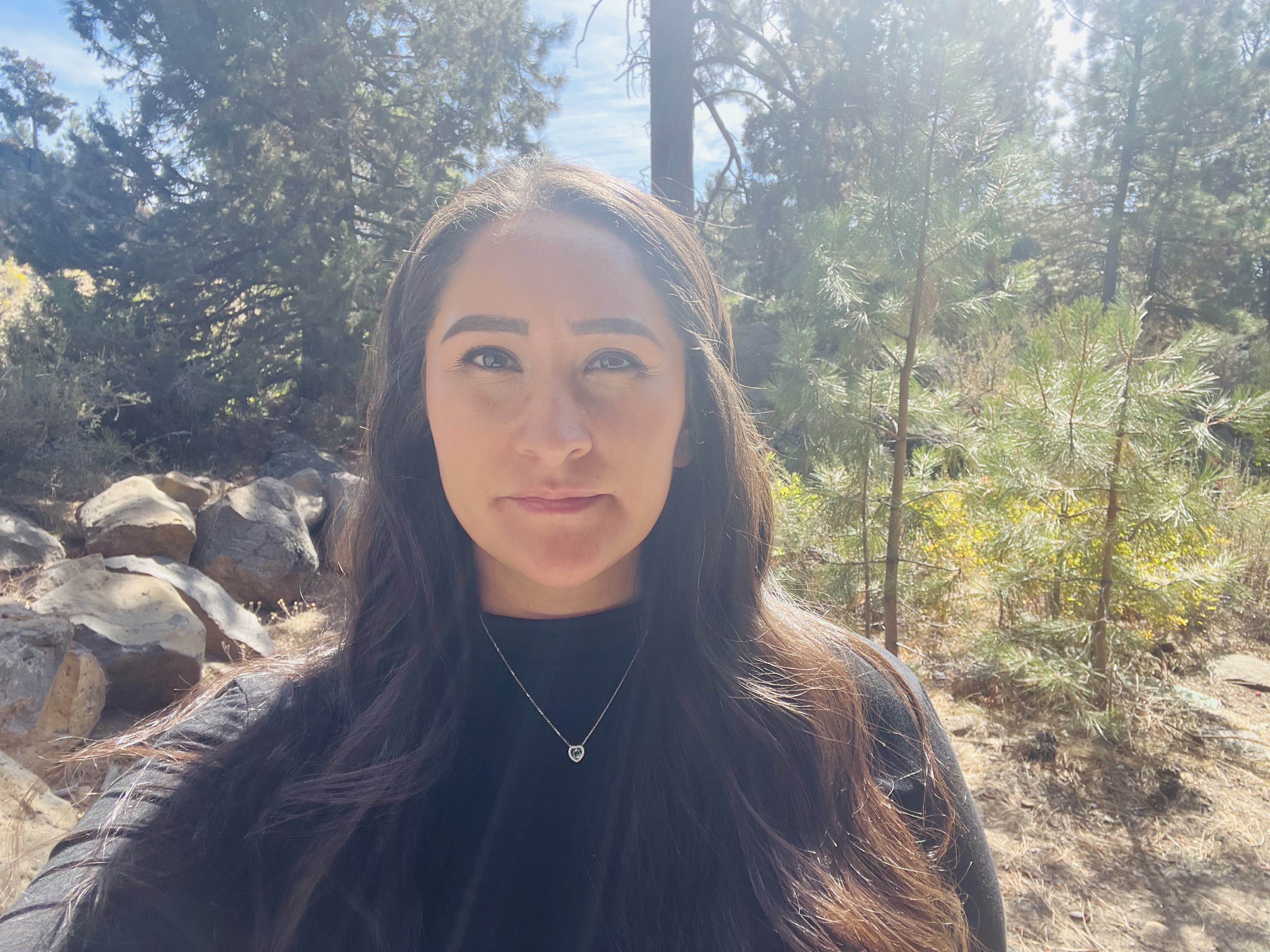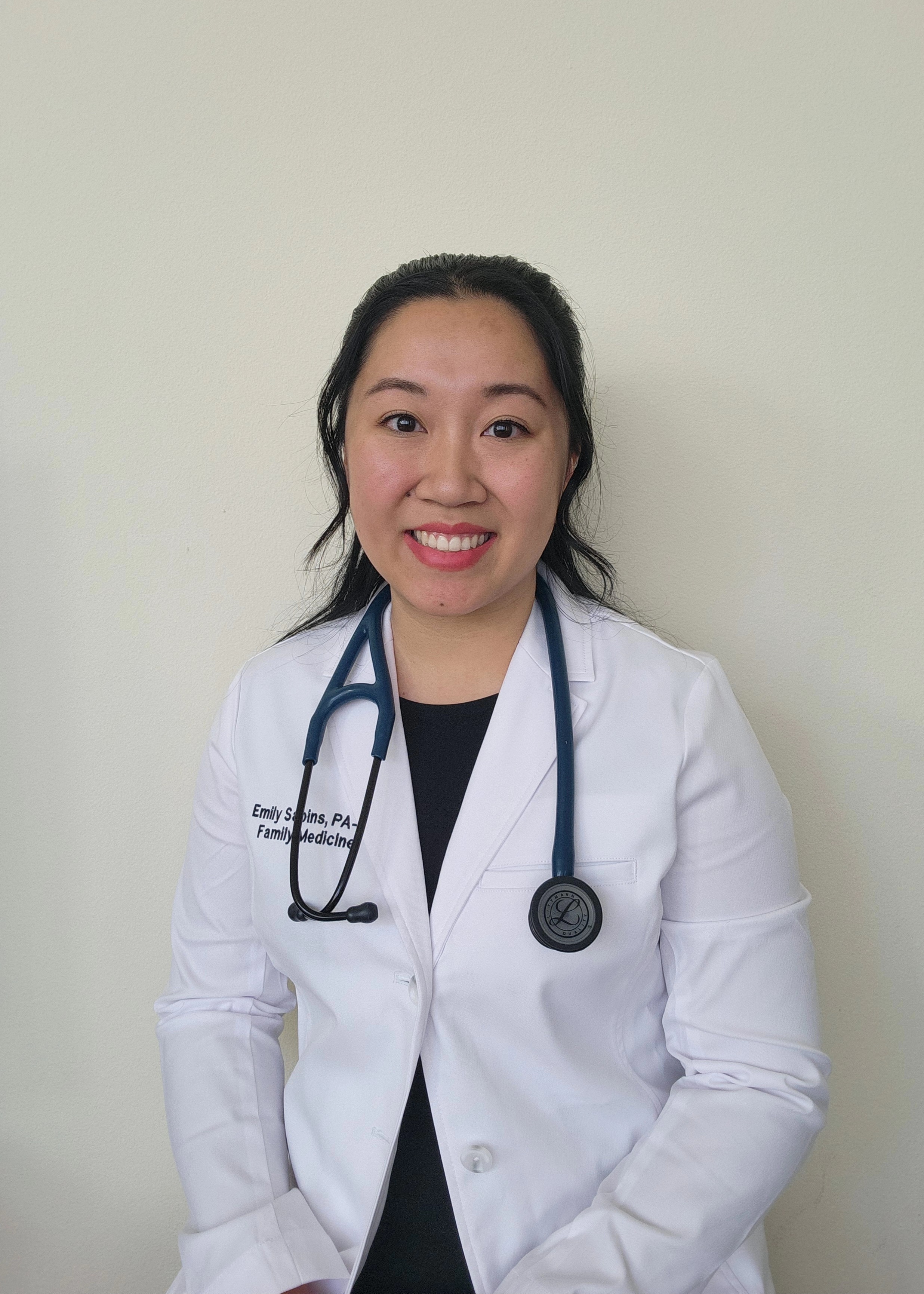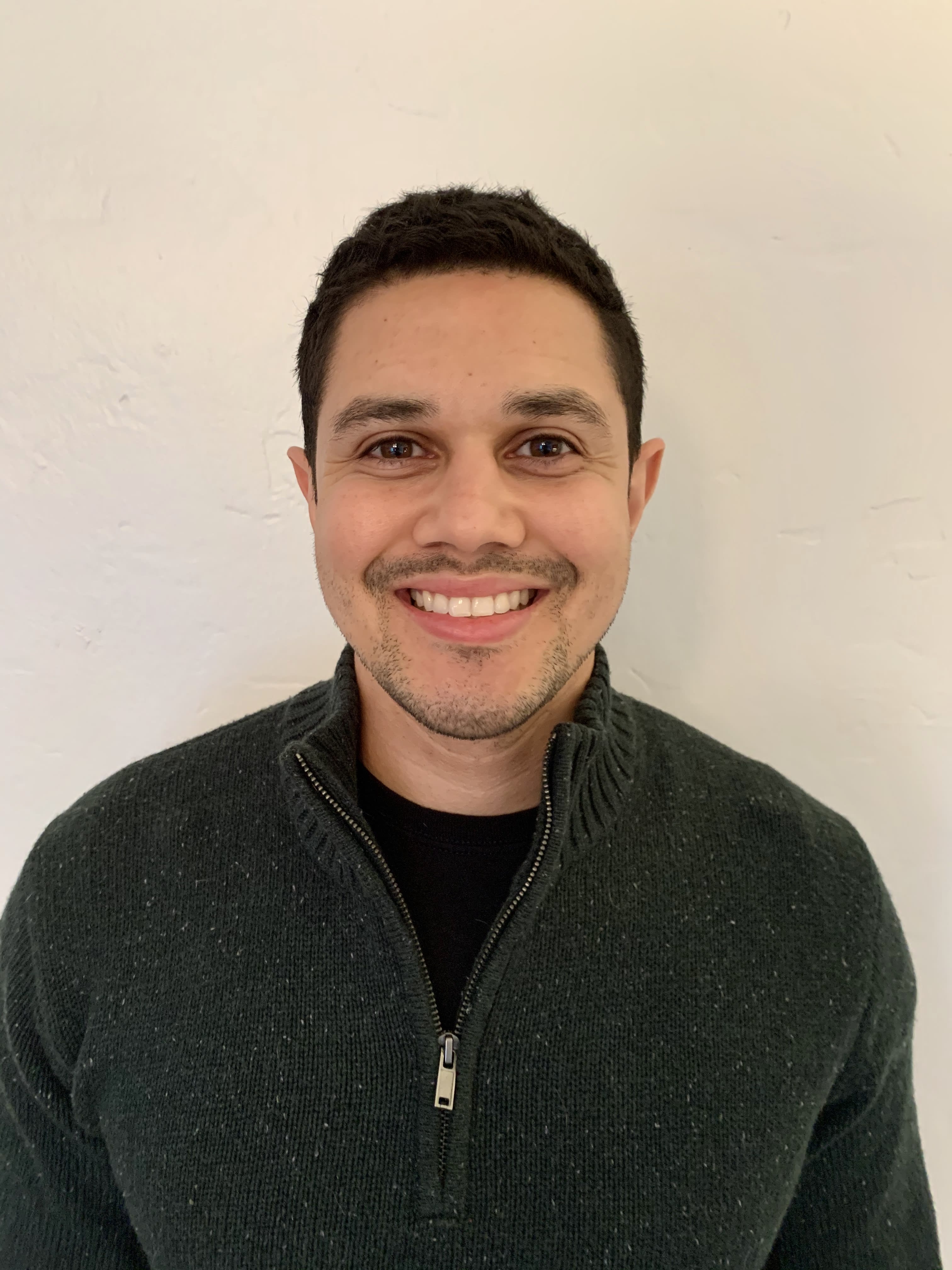Meet a nurse whose journey into health care was shaped by mentorship from Oregon AHEC, a physician associate who achieved her career goals thanks to the AHEC pathway, and a psychiatric nurse practitioner who completed his training at home in Eastern Oregon with tuition and expenses covered by AHEC. These are just a few of the many professionals whose lives have been transformed by Oregon AHEC and who have gone on to serve rural and underserved communities. Read their stories:
From Student to Leader: Janet Hernandez’s AHEC Journey

Janet Hernandez’s journey with AHEC began in high school, where she participated in hands-on health care experiences that shaped her path to becoming a nurse. Inspired by the mentorship of Shelley Dougherty — who served as the executive director of Oregon Pacific AHEC (OPAHEC) until 2024 — Janet developed a passion for health care education and later joined the OPAHEC board. Now, she supports the next generation of health care professionals by expanding resources and opportunities for students in Northwest Oregon, including coastal and Willamette Valley communities. In this Q&A, Janet shares how AHEC influenced her career and the important work being done to improve health care education in Oregon.
Q: What was your experience with AHEC in high school, and what programs did you participate in?
A: It was the best. I was fortunate to have Shelley as my teacher. I took a health occupations course where we learned basic first aid, infection control, and workplace safety. I also participated in job shadowing, spending time with health care workers in private family practices, hospitals, physical therapy clinics, dental offices, and long-term care facilities. Beyond that, we engaged with our community — teaching second graders about dental hygiene at a local elementary school and offering free blood pressure checks at a grocery store. AHEC kept me busy and motivated.
Q: How did AHEC pathway programming help you on your journey to becoming a nurse?
A: AHEC taught me essential skills like writing a resume, crafting a cover letter, filling out applications and navigating the college and financial aid process. I also had the opportunity to job shadow and interview many nurses across different departments, which solidified my decision to pursue nursing.
Q: Why did you decide to join the Oregon Pacific AHEC board?
A: Shelley was the reason I joined. I admire everyone on the board for their passion for supporting Oregon’s youth. I want to contribute by encouraging young people to pursue careers in health care and by increasing available resources to help them succeed.
Q: What is something that the board has accomplished that you are proud of?
A: Mental Health First Aid. AHEC is actively working to increase mental health resources, raise awareness and reduce the stigma surrounding mental health. It's a crucial initiative, and I’m proud to be part of an organization that prioritizes this work.
Emily’s Path from AHEC Participant to Physician Associate

This essay was written by Emily Sabins, PA-C, in 2025.
My journey to navigate my path from high school to Physician Associate (formerly, Physician Assistant) school was daunting and confusing. I was searching for a program to affirm and bolster my interest. Dedicating over 6,000 hours to the Area Health Education Center of Southwest Oregon (AHECSW), I credit the confidence in my decision to pursue a career as a Physician Associate (PA) to them.
As a sophomore in high school, I had an inkling of interest in the medical field. In April 2015, Oregon AHEC, in partnership with Mercy Medical Center in Roseburg, OR, hosted a “Diagnosis Day” where the doors of the ER and OR were open to students to reenact an emergent scenario — from an ambulance to the operating table and everything in between. I was overwhelmed with the sights and sounds in the hospital. I was in awe by the physicians and PAs who were hosting the event, and a spark for medicine lit in me that day.
Throughout my time in high school, I attended every open seminar and lecture hosted by the Brightworks Program of AHEC. There, my peers and I were able to learn about dissections, suturing, CPR, general clinical procedures, and health care professions. The most memorable experience AHEC provided me with was a tour of the 博彩网站 campus and its hospital. Over the three-day course, I attended classroom lectures, rehearsed simulations with mannequins, and practiced patient encounters. I valued the problem-based learning model that helped make students more comfortable in real-life medical situations. On the first day, when I stepped onto the campus, I immediately felt like I thrived in this environment, and at the end of my time at 博彩网站, I was sure I wanted to be a PA.
In college, I was focused on my classes and GPA. AHECSW staff would always check in on me and offer support or guidance when I needed it. My motivation and drive remained steadfast with their continued support. During college, I was able to engage with students through Q&A panels and program development projects for their organization.
Immediately upon graduation, I started working as a certified medical assistant (CMA), scribe, and phlebotomist at Aviva Health, a Federally Qualified Health Center (FQHC) in rural Oregon. As a Roseburg native, I felt a brewing passion to serve the community that once served me. At Aviva, I have enjoyed the quick pace and the varied work. I assisted in minor procedures such as biopsies, ultrasounds, EKGs, and wound cultures. I witnessed rare cases, such as Medically Assisted Treatment to address opioid abuse in our community. I was fortunate to work with the Aviva residents and attendings. Overall, I gained over 2,000 clinical hours with a fantastic team.
In 2022, I was accepted into the top 5 PA programs in the nation at Oregon Health & Science University (博彩网站). With the aid of the Scholars for Healthy Oregon Initiative (SHOI), I was awarded a full-ride scholarship to the 博彩网站 PA program. During my clinical year, I rotated at rural sites, including Coos Bay, Coquille, Scappoose, and Roseburg. Furthermore, being an AHEC Scholar during PA school equipped me with the skills and confidence to navigate rural locations and understand the health care gaps — such as lack of access to care, medically complex patients, and limited specialty resources. I was able to attend the annual Oregon Rural Health Conference in Bend, OR. Soon after, I graduated from 博彩网站 in August 2024 and began practice in November 2024 at an urban FQHC as a primary care PA. Now, I focus on family medicine, preventative care, and special population care for migrants, seasonal farm workers, and those who identify with a minority group.
AHECSW’s dedication to the mission of engaging high school students in the “provider pipeline” has always amazed me. Starting in high school when students are just finding out about different health care professions and granting the opportunity to shadow is beyond valuable. I would not have been able to set up shadowing opportunities or enroll in summer medical camps without AHEC’s assistance. Furthermore, after college, being a part of their Reconnect Fellows program gave me first-hand experience in the medical field being a CMA, scribe, and phlebotomist. The community and relationships with other fellows were something that would not have been possible without AHEC’s coordination of social gatherings, clinic placements, and monthly check-ins. AHEC also sponsored CPR training classes, mentorship with alumni of the Reconnect program, and offered interview coaching during this time. Then, during PA school, the AHEC Scholars program allowed for additional didactic and clinical training. After graduation, Oregon AHEC and the Office of Rural Health helped me find job opportunities that would satisfy the requirements for SHOI but also be a good fit for my goals and interests.
In summary, Oregon AHEC has been an integral part of my journey to becoming a rural health care provider. From the beginning, I felt supported by AHEC and the opportunities they had throughout the years. I highly recommend this program to anyone interested in becoming a health care professional and/or planning to work in rural Oregon.
A Success for the State: Darren Ramcharan’s Journey to Becoming a Psychiatric Mental Health Nurse Practitioner

This story was written and published by Northeast Oregon AHEC (NEOAHEC). Check out the center's website to read about more Stories of Impact.
Even though Darren’s pathway to becoming a health care professional didn’t lead him back to Eastern Oregon, his success is a great example of his passion for caring for underserved communities and his connection to the "grow our own" mission of NEOAHEC.
Darran Ramcharan, from Hermiston, Oregon, found his place in health care while working as a nurse at Eastern Oregon Correctional Facility in Pendleton. He realized that many of the people who were incarcerated had mental health issues and grew passionate about their care. He enrolled at 博彩网站 in their DNP Psychiatric Mental Health Nurse Practitioner (PMHNP) distance program and received a scholarship from the Oregon Health Authority (OHA) through NEOAHEC. During this time, he and his wife had two children, both of whom were diagnosed with cystic fibrosis. He was unable to remain living rurally due to the health care requirements of his children, but the OHA continued to provide the scholarship. He completed his degree and is now working at Coffee Creek Correctional Facility in Wilsonville. Darren's role providing medication management along with psychotherapy to people who are incarcerated is a huge success, and NEOAHEC is proud to have played a small role in his story.
In 2020, after completing his second bachelor's degree (the first in Biology from Eastern Washington University and the second in Nursing from Concordia University), Darren applied for 博彩网站's Psychiatric Mental Health Nurse Practitioner (PMHNP) program. A PMHNP is an advanced practice nurse qualified to diagnose and treat patients experiencing mental health challenges. 博彩网站, in partnership with NEOAHEC, offers this graduate-level program designed to prepare students to provide psychotherapy and psychopharmacology to patients of all ages in a wide variety of settings.
Once accepted into the PMHNP program, he received a postcard in the mail from NEOAHEC informing him of a new program that expanded the 3-year Doctor of Nursing PMHNP program from 博彩网站 to a distance delivery model serving Eastern Oregon. As people in rural areas have increased difficulty obtaining education without moving away from their communities, this distance program allows students to complete almost their entire course load virtually. The program was part of the Healthy Oregon Workforce Training Opportunity (HOWTO) grant sponsored by the Oregon Health Authority (OHA), and NEOAHEC had received $1 million for this effort. The scholarship that Darren received included tuition, a laptop, and additional funds for books and other costs, in addition to being able to do the program from Eastern Oregon and being able to stay at home with his two children. He graduated with a Doctor of Nurse Practice (DNP) degree in June 2023.
During this time, he and his wife were spending significant amounts of time on medical care for their children. They were living in Pendleton, and most appointments were referrals to Tri-Cities and Portland. They had no choice but to travel frequently. Ultimately, they couldn’t continue to make living rural work.
Initially, after relocating to Salem to be closer to health care options, Darren was concerned about his scholarship. He had committed to staying rural and to continue serving underserved communities, but due to his circumstances, he wasn’t able to do it. The OHA reached out to him, and he received an email that they will continue to provide the scholarship. In the end, he found a way to keep part of his promise by continuing to work in the prison system.
As a Psych NP, his position includes psychotherapy and prescribing psychotropic medication to assist with ongoing symptoms or side effects. He also makes significant effort to use a therapeutic modality during each of his sessions, including Cognitive Behavioral Therapy (CBT), mentalization, and promoting self-compassion and empowerment. He believes in taking this effort to ensure he spends time on skill-based learning rather than solely medication adjustments to provide holistic care. His take on providing care hopes to affect large changes though small choices over time. He finds forensic nursing particularly intriguing because it bridges a gap between the legal system and mental health care, a place where people frequently need care but have limited access to it. In addition, forensics has a unique population focus that is often overlooked and stigmatized.
His schedule for this position includes four ten-hour shifts, two of them being telehealth, though he is on call 24 hours a day. While he’s currently living in Salem for both family support and to be closer to health care, he sees himself moving toward a more rural setting in the future, even if that means commuting further to continue this vital work. Darren advised that students keep their options open when it comes to job location after choosing a career in health care — there are more options available than just in a hospital. Health care doesn’t need to be that high stress, working lots of hours, always busy lifestyle portrayed in media — there’s a space for being family-oriented.
People like Darren are why NEOAHEC is committed to providing health care education resources to all students, regardless of their situation. Even though Darren’s pathway to becoming the health care professional he wanted to be didn’t lead him back to Eastern Oregon, his success is a great example of his passion for caring for underserved communities and his connection to the ‘grow our own mission’ of NEOAHEC.